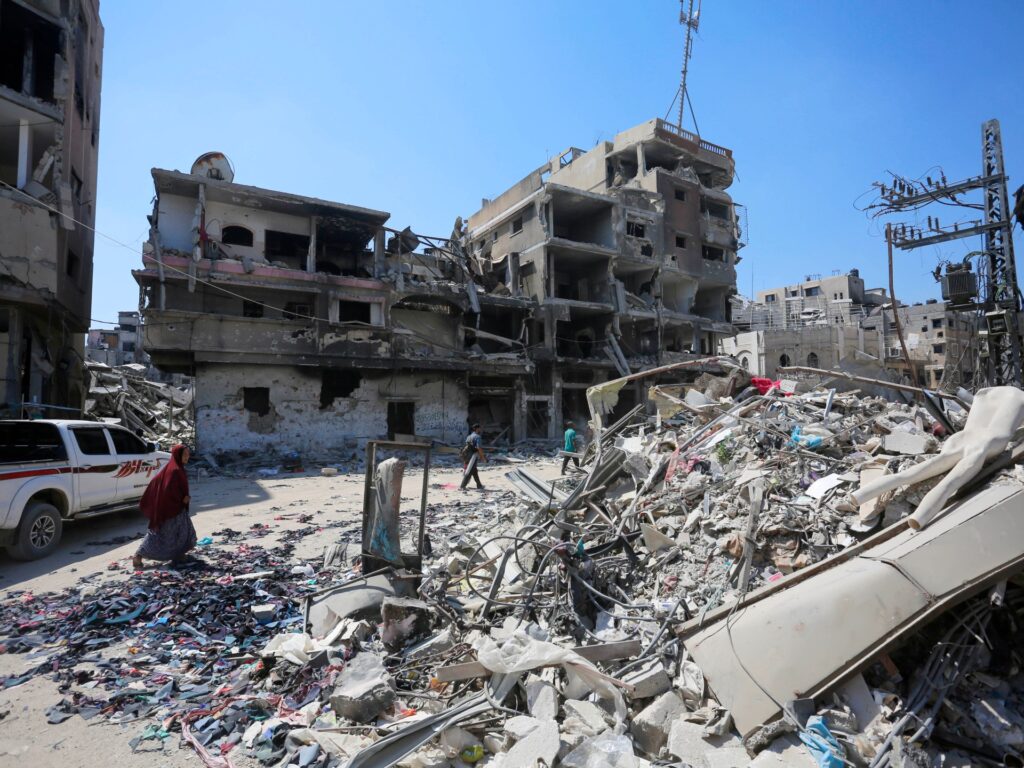As part of its report on the suffering of families in Gaza, The Guardian newspaper reported the reality of the Al-Barawi family in light of Israel’s war on Gaza, which began on the morning of October 7, 2023, when Nima Al-Baraawi woke up early to prepare her children for school and prepare bread as usual.
At exactly 6:29 am, the 36-year-old woman heard the sound of rockets fired by the Islamic Resistance Movement (Hamas) towards Israel from near her home in Beit Lahia, in the northern Gaza Strip.
Rumors quickly spread that Hamas had penetrated Israel’s borders, so Nimah decided to keep her five children at home. Without knowing the details, she was sure that Israel’s reaction would be horrific, so she began collecting important documents and packing some clothes.
Next door, Youssef Al-Baraawi, her 22-year-old nephew, was preparing to go to Beit Lahia University, where he is studying medicine, when he heard the sound of rockets. Commenting on this moment, he said, “After that, our whole life changed, and we still don’t know if what we are living is true.” Today, is it a dream or a reality, because what we witnessed is beyond imagination.”
“There’s no one left”
A week later, the Israeli army ordered the residents of Beit Lahia to evacuate their homes, so Naama headed south with her children, but her husband, a 40-year-old farmer, stayed behind to care for his elderly parents, whose health condition did not allow them to move. Youssef also stayed behind, hoping to benefit others in his capacity. A young doctor.
Youssef survived the first weeks of the war, and after a ceasefire in late November, at 6:20 a.m. on the first day that hostilities resumed, Youssef left his grandfather’s house in search of a better Internet connection in a nearby building, when suddenly an explosion shook the ground. big.
Youssef was bruised and remained in his place for a few minutes, trembling in anticipation of a second raid. However, his injuries were not serious. He ran tens of meters away from his family’s home, only to find it in ruins. He described that moment to the Guardian, saying: “I froze in place and no longer felt anything, and I kept looking.” “Into the gray rubble, my family’s home has become a grave.”
Inside the house were Youssef’s parents, his brother, his grandfather, 3 of his uncles and aunt, and 8 of his nephews and nieces. The death toll from the Barawi family that day was 30 martyrs.
Youssef continued: “I went and performed ablution silently and prayed, but I could not speak. The ambulances did not come, but some people gathered around the house. We waited until the next morning and then began exhuming the bodies of my family. It was difficult to identify them.”
In Rafah, in the far south of the Gaza Strip, one of Nimah’s relatives found her in her tent and conveyed a brief message to her stating that “something had happened” and that “people from the Barawi family had been martyred.” Nimah spent a frantic hour trying to find out more, moving groggily from From tent to tent she sobbed, and after finding another cousin, and begging him to tell her the truth, came the bitter reply: “There is no one left.”
“We will not forget, but we must move forward.”
The year has been difficult for the family members, and the survivors of the Barawi family still remember their lives before the war, their crowded, lively homes, their colorful gardens with vegetables and flowers, Beit Lahia restaurants, their trips to the beach, and the large banquets, holidays, and events that brought the family together.
Nimah told the newspaper: “In the week that followed their martyrdom, all my feelings were dead and I had no will to do anything, but I had to protect and support my children… I told them that their father was in heaven and that I would return everything to them as it was before.”
She added: “What worries me most now is that this war will continue for a longer time, and I fear that I will lose one of my children or that I will be left alone. We cannot and will not forget, but we must move forward.”
As for Youssef, he is still trying to rebuild his life again. The medical student volunteers at a hospital in Khan Yunis, where he now lives. He said: “I suffer every second and minute of my life. I feel pain, oppression, injustice, and fatigue, but I still thank God that I am alive.” .
Like this family a lot
A recent investigation by the Associated Press revealed, according to the report, that more than 60 Palestinian families in which at least 25 people were martyred – and in some cases four generations of the same family were killed – as a result of attacks that occurred between October and December 2023. It was the bloodiest and most destructive period of the war.
Nearly a quarter of those families lost more than 50 members, other families were exterminated and no one of their lineage remained to document the number of their martyrs, especially since the exchange of information became more difficult with the continuation of the war and the displacement of 80% of Gaza’s population.
Rami Abdo, head of the Human Rights Observatory in Geneva, told The Guardian that his team found that 365 families had lost 10 or more members from the beginning of the war until August 2024, and there were 2,750 families who had lost at least three members. He said: “The bulk of “Mass killings in the first three months, but continued at a slower pace after that.”


